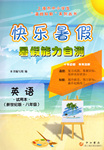题目内容
In China,people born in and after the 1980s are called the post-80s generation(一代人).Most of them come from single-child families. However,this generation is playing a more and more important part in China,and their image in people’s minds is changing.Han Han,a popular youth writer,is one of them.
Han Han was born in 1982 in
Shanghai.His talent for writing was clear at an
early age.When he was 17,he drew the public’s
attention with the article Viewing the People through the Glass. The article
won first prize in the national New Concept Composition Competition.Later,Han Han again surprised
the public  by
leaving high school. “I did poorly in Grade One of high school and failed to
move up to the next grade. I tried my best to improve my studies,but failed ,so I gave up. However ,I am always
learning, since learning and going to school are two different things.” Han Han
said.
by
leaving high school. “I did poorly in Grade One of high school and failed to
move up to the next grade. I tried my best to improve my studies,but failed ,so I gave up. However ,I am always
learning, since learning and going to school are two different things.” Han Han
said.
Han Han’s first novel Three Folded Gates sold very well in China.Later the book wastranslated(翻译)into several languages and sold abroad.
In the following years,Han Han wrote a lot of books. All of them were welcomed by the market.In 2006,he started blogging(写博客)and had great success. Today,Han Han’s blog has become one of the honest blogs on the Internet.
1. The post-80s generation__________.
A. have changed China’s image
B. are playing an important role in China
C. are very good at writing
D. are people who are more than 80 years old
2.What can we learn from Han Han’s words in the second paragraph?
A. He was good in all his subjects.
B. He never studied hard at school.
C. His school life was interesting and colourful
D. He didn’t stop learning after he left school.
3.When did Han Han begin to write a blog?
A. When he was seventeen. B. When he was fourteen
C. When he was twenty D. When he was twenty-four.
4.Which of the following is TRUE,according to the passage?
A. Three Folded Gates was only sold in China.
B. Nobody was surprised that Han Han left high school.
C. Han Han was not liked by the post-80s generation.
D. Han Han’s blog is very popular on the Internet.
5.What does the passage mainly talk about?
A. The post-80s generation.
B. Han Han ,a popular post-80s writer.
C. Blogging on the Internet.
D. Popular books written by Han Han.
1.B
2.D
3.D
4.D
5.B
【解析】
试题分析:本文大意:中国的80后在中国起着越来越重要的作用,韩寒就是其中一位;韩寒1982年生于上海,17岁就因其写作天分也出名,后来又以离开高校再次震惊公众,但他一直在学习。他的许多书都深受读者喜爱。2006年,他开始写博客并且获得了巨大的成功。
1.细节理解题。根据However,this generation is playing a more and more important part in China,然而,这一代正在中国起着越来越重要的作用,可知答案选B。
2.细节理解题。根据However ,I am always learning, since learning and going to school are two different things.然而,我一直在学习,因为学习与上学是不同的两件事,可知答案选D。
3.细节理解题。 根据Han Han was born in 1982 in Shanghai.韩寒1982年生于上海;In 2006,he started blogging(写博客)and had great success.2006年,他开始写博客并且获得了巨大的成功,可知答案选D。
4.推理判断题。根据Later the book
wastranslated(翻译)into several languages and sold abroad.后来这本书被译成几种外语,远销国外;In 2006,he started
blogging(写博客)and had great success.2006年,他开始写博客并且获得了巨大的成功;Later,Han Han again
surprised the public  by
leaving high school.后来,韩寒再次以离开高校震惊公众; I did poorly in Grade One of high school
and failed to move up to the next grade.我在高校一年级学的不好,没有升到二年级,可知答案选D。
by
leaving high school.后来,韩寒再次以离开高校震惊公众; I did poorly in Grade One of high school
and failed to move up to the next grade.我在高校一年级学的不好,没有升到二年级,可知答案选D。
5.主旨大意题。根据全文可知是主要讲的80后青年韩寒, 故答案选D。
考点:人物传记类短文阅读。

 快乐暑假暑假能力自测中西书局系列答案
快乐暑假暑假能力自测中西书局系列答案
| World Expo(世博会) 2010, Shanghai China | |
| Address | Shanghai World Expo Garden |
| Phone | +86-21-962010 |
| Open time | 8:30 a.m.-10:00 p.m. (Saturdays to 10:30 p.m.) |
| Ticket | Adult: ¥160 Kid: ¥80 |
| E-mail | expo2010@hotmail.com.cn |
| Website | www.expo2010.cn |
| How to get there | by subway 42 special bus routes(专线) |
| How to book tickets | by phone or through the Internet |
| Theme | Better City, Better Life |
| Feature | ● It is the first time for the 159-year-old World Expo to be held in China, a developing country. ● It’s another great event for China after the successful Beijing Olympics in 2008. ● 189 countries present(展示) their best from May 1st to October 31st. |
【小题1】If you want to book a ticket to World Expo 2010, you can’t ________.
A. e-mail expo2010@hotmail.com.cn
B. write a letter
C. call +86-21-962010
【小题2】Mr. Chen and his wife want to go to Shanghai Expo with their child, they will pay _______in all.
A. ¥160 B. ¥320 C. ¥400
【小题3】Last Saturday, Michael went to visit Shanghai Expo. He had to leave there ________.
A. before 8:30 a.m. B. by 10:30 p.m. C. after 11:00 p.m.
【小题4】Shanghai World Expo lasts for ________.
A. six months B. 159 days C. 189 days
【小题5】You mustn’t go to Shanghai World Expo by ________.
A. subway B. motorbike C. bus